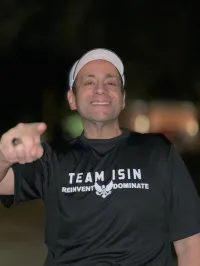Eddie's Blog
Welcome to Edward "Eddie" Isin's weekly blog, where you'll discover valuable insights on personal growth, spirituality, sales, the art of influence, and uncovering your true passion in the realms of love and relationships, health and well-being, career advancement, as well as achieving financial and time freedom.

Unlock Your Potential: Self-Improvement Strategies from Experts in Identity Transformation and Mindfulness
In a world that often feels artificial and overwhelming, finding your true self and unlocking your potential can seem like a daunting task. We are constantly bombarded with societal pressures, expectations, and the struggle to fit into predefined roles. But what if there was a way to break free from these constraints and discover a more authentic, fulfilling life?
In episode 25 of the Transform Your Future podcast, titled “Authenticity in an Artificial World: Your Path to True Identity,” I sat down with Christopher Zdenek, an expert in paradigms, consciousness, and human development. Together, we explored powerful self-improvement strategies that can help you transform your identity and embrace mindfulness to unlock your potential. The full version of the audio podcast is below and the video version is at the bottom of the page.
Discover Your True Self Through Mindfulness and Meditation
Mindfulness and meditation are more than just trendy buzzwords—they are essential practices that can help you develop a deeper understanding of yourself and the world around you. During our conversation, Christopher shared profound insights into how these practices can lead to personal and spiritual freedom.
Christopher Zdenek: "So what Neo represents in the film trilogy is what happens when our frontal lobes grow out and we start separating, and we see that what we have identified with a map in our head of how reality is, is just one of an infinite choice of maps. In the popular culture in movies, that's called the multiverse. You see it in Spider-Man and a bunch of other movies, right? Multiverse, multiverse, multiverse. So you separate consciousness, you have an independent observer, you start becoming aware of different mental maps that you can have. And like clothes, if you get really comfortable with this, you can start trying on different clothes. And this in fact is the fundamental kind of driving force unconsciously of things like the whole LGBT movement. And it's not so much that it's important or needed that you change your sexuality or your clothes or anything like that. It's that you separate from a stuck fixed identity that is so limiting to the spirit."
This idea of having an "independent observer" within ourselves is crucial. By practicing mindfulness, we can develop this observer and start watching our thoughts and behaviors without judgment. This leads to greater self-awareness and emotional regulation, helping us navigate life’s challenges with a clearer mind.
I’m fascinated with these ideas of identity and reinvention. For example, I had a bunch of situations happen to me all at the same time that left me not being able to walk and having serious physical disability problems. And I gained an enormous amount of weight from being depressed and not functioning properly. I did everything I could to manage it myself and put in my own effort to change my life and lifestyle. But at some point, the fastest way to be able to walk again and live some kind of reasonable life was going to be having a gastric bypass surgery. And so this took a huge commitment really because you're physically changing your body for the rest of your life."
Mindfulness and meditation allow us to "try on different clothes" and explore various aspects of our identity. This can be incredibly liberating, as it helps us break free from fixed, limiting identities that no longer serve us.
Improve Your Mental Health by Overcoming Societal Pressures
Societal expectations can often feel like a heavy burden, leading to stress, anxiety, and a sense of being overwhelmed. Our discussion highlighted how developmental stages and early experiences shape our perceptions and behaviors. By understanding these stages, you can start to:
Identify Limiting Patterns: Recognize where you might be stuck in a developmental stage and take steps to move forward.
Heal from Trauma: Address the impact of early trauma on your mental health, and learn strategies to heal and grow.
Reclaim Your Identity: Break free from societal pressures and external expectations, and start living a life that is true to who you are.
Christopher Zdenek: "The United States, in my research over the decades, clearly is the representation in the human species of the adolescent stage. And one fabulously interesting factoid from the media, the 80s, the media named the me decade or the me generation. And then you had the big t-shirts and slogans of it's all about me. And so adolescence has that predisposition of getting very kind of ingrown toenail-ish because it is so overwhelmed by the perception of separateness. And you see this in all the teenagers. It's like, I'm me. Who's looking at me? Do I look OK? I'm really worried about judgment and how I'm being seen. And the internet, social media, all of that has been increasing the pinnacle of adolescent cognitive awareness and personal experience of reality."
Understanding that our society often operates at an adolescent level of consciousness can help us see why we feel so much pressure to conform and be "seen" in certain ways. By recognizing these influences, we can start to make conscious choices about how we want to live our lives.
What is Neuroplasticity?
Neuroplasticity, also known as brain plasticity, is the remarkable ability of the brain to reorganize itself by forming new neural connections throughout life. This process allows neurons (nerve cells) in the brain to compensate for injury and disease and to adjust their activities in response to new situations or changes in their environment. Neuroplasticity plays a crucial role in learning, memory, and recovery from brain injuries.
Key Points About Neuroplasticity:
Learning and Memory: Neuroplasticity is fundamental to learning new skills and forming memories. When you learn something new, your brain creates new neural pathways, strengthening the connections between neurons. This is why practice and repetition are essential for mastering new skills.
Recovery from Brain Injury: After a brain injury, neuroplasticity enables the brain to reorganize and form new connections to compensate for lost functions. This is the basis for many rehabilitation therapies, which aim to stimulate the brain and encourage the formation of new pathways.
Adaptation to Change: The brain's ability to adapt to new experiences, sensory inputs, and changes in the environment is a result of neuroplasticity. This adaptability helps humans survive and thrive in diverse and changing environments.
Emotional and Psychological Health: Neuroplasticity also plays a role in mental health. For example, practices like mindfulness and cognitive-behavioral therapy (CBT) can lead to positive changes in brain structure and function, helping individuals manage stress, anxiety, and depression.
How Neuroplasticity Works:
Synaptic Plasticity: This involves changes in the strength of connections between neurons (synapses). When synapses are frequently used, they become stronger and more efficient, a process known as long-term potentiation (LTP). Conversely, unused synapses may weaken or be eliminated, a process called synaptic pruning.
Structural Plasticity: This involves changes in the physical structure of the brain. New neurons can be generated (neurogenesis), especially in certain areas like the hippocampus, which is important for learning and memory. Additionally, the brain can form new dendrites (branching extensions of neurons) to create new connections.
Functional Plasticity: This refers to the brain's ability to move functions from damaged areas to undamaged areas. For example, after a stroke, healthy parts of the brain can take over the functions that were previously managed by the damaged regions.
Enhancing Neuroplasticity:
There are several ways to promote and enhance neuroplasticity:
Learning New Skills: Engaging in activities that challenge the brain, such as learning a new language, playing a musical instrument, or solving puzzles, can stimulate neuroplasticity.
Physical Exercise: Regular physical activity has been shown to support neurogenesis and improve cognitive function.
Mindfulness and Meditation: Practices like mindfulness, being present and focusing on our thoughts, feelings and surroundings and meditation, focusing our attention to our spirit, soul or our connection to all living things, can lead to structural changes in the brain and improve emotional regulation and cognitive flexibility.
Healthy Diet: A diet rich in omega-3 fatty acids, antioxidants, and other nutrients supports brain health and neuroplasticity.
Adequate Sleep: Sleep is essential for memory consolidation and brain repair processes.
In summary, neuroplasticity is a powerful mechanism that underlies our ability to learn, adapt, and recover. By understanding and harnessing this capability, we can improve our cognitive and emotional well-being, enhance our ability to learn new skills, and recover from brain injuries more effectively.
Practical Self-Improvement Strategies
Throughout the episode, we shared practical tools and strategies to help you on your journey of self-improvement and identity transformation:
Vipasana Meditation: This form of meditation helps you develop an independent observer, allowing you to gain insights into your thoughts and behaviors.
Christopher Zdenek: "Vipasana meditation, that essentially is the practice of a meditation where you're building, like you're working out at the gym, building that bicep an independent observer. So instead of closing your eyes and just relaxing and zoning out, you are starting to watch your mind stream."
Neuroplasticity Exercises: Engage in activities that promote brain flexibility and growth, helping you adapt and thrive in new ways.
Christopher Zdenek: "We in recent years have transcended the initial scientific understanding that certain things grow to a certain stage and they're fixed. Right now we've learned about neuroplasticity, for example."
Reinvention Techniques: Learn how to reinvent yourself at any stage of life, using the insights gained from mindfulness and developmental understanding.
Anybody at any time really could, try on the new clothes and start moving into a new way to live. I love the fact that this is uniquely possible for anyone at any stage of life. If you look at who you are, what you're doing, what you are thinking, what you are feeling, how you are acting, why are you doing these things, you can uncover patterns that hold you back from living a fulfiling life. The only person holding you back from change is yourself. For example are you really doing what you want to be doing? Can you develop to a higher self? Can you get in touch with your true self?
Embrace the Journey of Self-Improvement
The journey of self-improvement and identity transformation is ongoing. It requires patience, persistence, and a willingness to explore and embrace new perspectives. By integrating mindfulness and understanding developmental stages, you can navigate this journey with greater clarity and confidence.
Obviously I believe in reinvention. I believe that you have the ability to change. I've changed myself many, many times. I feel like it's a lifelong process that you listen, you observe, and as you recognize things, you say, oh, that's interesting. What is that about? Why am I doing it that way? I just noticed that that's a pattern. When you find things that cause you stress, worry, pain and suffering we should remove them.
Christopher and I both emphasize the importance of being curious and open-minded about your own patterns and behaviors. By doing so, you can identify areas for growth and take steps toward a more fulfilling life.
The Role of Trauma in Identity and Behavior
One of the key topics we discussed was the impact of trauma on identity and behavior. Trauma can create deep-seated patterns that limit our potential and keep us stuck in negative cycles. Understanding and addressing these patterns is crucial for personal growth.
Christopher Zdenek: "If you had that really traumatic experience in that initial perception of separateness and the trauma just laid down super deep grooves in the neural nets and you are stuck in a canyon... It's almost the engine of capitalism. It's when capitalism took a dysfunctional turn and turned into an endless project of trauma stuffing, the empty hole of brokenness, which can never be filled, which is really behind the environmental destruction of the planet. And our sense of separateness is what's behind our capacity to destroy the world and to not see us as the environment and that's our home."
Healing from trauma involves recognizing and processing these deep-seated patterns. This can be done through various methods, such as therapy, mindfulness practices, spirituality and self-reflection. By doing so, you can free yourself from the constraints of past trauma and move toward a more empowered, authentic self.
Integrating Developmental Stages
Another important aspect of our discussion was the integration of developmental stages. Christopher explained how each stage of development shapes our worldview and behavior, and how integrating these stages can lead to greater self-awareness and growth.
Christopher Zdenek: "The biggest thing is integrating all of the previous stages, and this is really where the human race is at the present moment... The unbelievably important thing for us to do is to reconnect with the previous stages. So in ourselves, that's reconnecting with the infant experience that is in our body."
By understanding and integrating these stages, you can gain a deeper understanding of yourself and your behaviors. This process can help you identify areas where you might be stuck and take steps to move forward.
Practical Steps for Personal Growth
Here are some practical steps you can take to start your journey of personal growth and identity transformation:
Practice Mindfulness: Make mindfulness a daily habit. This can help you develop greater self-awareness and emotional regulation.
Reflect on Your Past: Consider how your past experiences have shaped your current identity. What patterns or beliefs might you have carried from childhood or adolescence that no longer serve you?
Set Intentional Goals: Think about what you want to achieve and who you want to become. Break your goals down into manageable steps and take consistent action.
Seek Support: Don’t hesitate to seek support from a therapist, coach, or mentor. They can provide valuable guidance and help you navigate your journey of self-improvement.
Conclusion
Unlocking your potential and discovering your true self is a journey that requires patience, persistence, and a willingness to explore and embrace new perspectives. By integrating mindfulness and understanding developmental stages, you can navigate this journey with greater clarity and confidence.
Upcoming book by Christopher Zdenek: "The Fractal Nature of Consciousness: The Evolution of the Global Human and the Driving Forces of History."
Book: "Complex PTSD: From Surviving to Thriving."
Book "Autobiography of a Yogi" by Paramahansa Yogananda
Contact: Text Eddie Directly @ 813-722-1417
Visit Chris' website
For more in-depth discussions and ongoing support, tune into our podcast, Transform Your Future, and join our newsletter at TransformYourFuture.com. where I write about reinvention, personal growth and identity. Stay connected with a community dedicated to personal growth and transformation, and receive regular insights and tips to help you on your journey.
Embrace the journey of self-improvement and discover the true potential within you. Listen to the full episode now and start transforming your future today!
Transform Your Future with Eddie Podcast on [] APPLE [] Spotify [] Amazon Music
Video version of all Transform Your Future Episodes on Youtube
Episode 25 Video version of podcast below

TEXT EDDIE @ (813) 722 - 1417
NAVIGATION

© Copyright 2023. Active Media Partners, Incorporated. All rights reserved.

